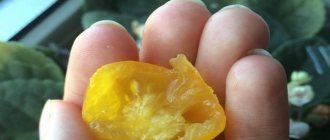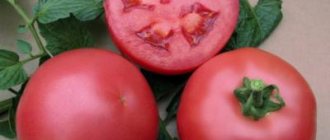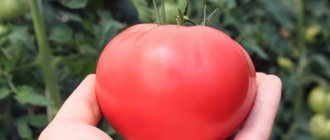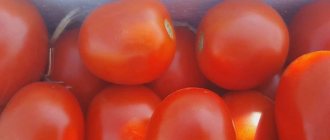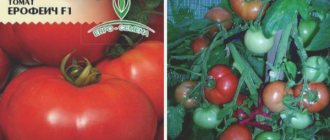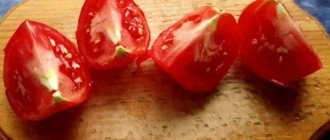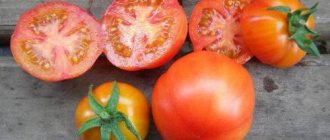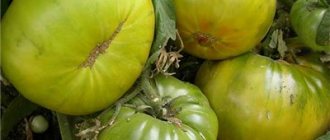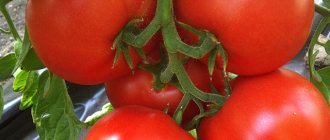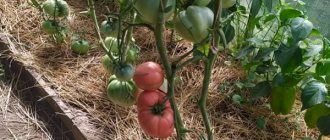Tomatoes “Golden Mother-in-law”: description of the variety
| Variety name | Golden mother-in-law |
| general description | Early maturing, high-yielding hybrid of the first generation |
| Originator | Russia |
| Ripening period | 85-90 days |
| Form | Flat-round with slight ribbing |
| Color | Yellow |
| Average weight of tomatoes | 120-150 grams |
| Application | Universal |
| Productivity of the variety | 2.5-4 kg per square meter |
| Features of cultivation | Standard agricultural technology |
| Disease resistance | Resistant to most diseases |
The hybrid tomato variety “Golden Mother-in-law” was bred by Russian breeder Lyubov Myazina and included in the state register of varieties in 2008.
This is a hybrid of the first generation F1, that is, obtained from crossing two other varieties and possessing the maximum set of qualities that the breeder wanted to put into it. “Golden Mother-in-Law” is an early variety; it takes 85–90 days from germination to the first ovaries. The bush is determinate, with a small number of leaves. About 80 cm in height. Read about indeterminate varieties here.
The hybrid shows high resistance to some common tomato diseases: tobacco mosaic virus (TMV), dry spot (alternaria) and bacteriosis (bacterial canker). The early ripening of fruits makes the Golden Mother-in-law hybrid suitable for cultivation in most regions of our country.
The variety is suitable for both open ground and greenhouses. The manufacturer primarily recommends film greenhouses, but in glass greenhouses “Golden Mother-in-Law” also shows excellent productivity.
Reviews from experienced gardeners
Let's look at real reviews of tomatoes "golden mother-in-law f1".
Alexandra, Volgograd: “I’ve been growing tomatoes for 3 years. I had them both in the greenhouse and in the beds, but I didn’t notice any fundamental difference. The tomato is appetizing, looks picturesque and colorful. Words cannot describe how it stands out from its red counterparts. The plants are hardy and did not get sick. I am very happy".
Victor, Samara: “I planted it as an experiment, and then began to grow it every year. I praise it for its taste, beauty and productivity. Children and grandchildren love it for the unusual color.”
Characteristics
The fruits of this hybrid set light green and become a beautiful yellow-orange color when ripe. In size - medium, weighing up to 200 grams, usually 120-150g. The tomatoes look very aesthetically pleasing, on the bush they are collected in dense clusters and ripen together. On the rounded, smoothed fruit, ribs are visible that separate 4 chambers with seeds. The fruit is dense. It stores well and is not prone to cracking with changes in temperature and humidity.
The table below will help you compare the weight of the fruits of the Golden Mother-in-law variety with others:
| Variety name | Fruit weight |
| Golden mother-in-law | 120-150 grams |
| Miracle Lazy | 60-65 grams |
| Sanka | 80-150 grams |
| Lyana Pink | 80-100 grams |
| Shchelkovsky Early | 40-60 grams |
| Labrador | 80-150 grams |
| Severenok F1 | 100-150 grams |
| Bullfinch | 130-150 grams |
| Room surprise | 25 grams |
| F1 debut | 180-250 grams |
| Alenka | 200-250 grams |
In open ground, up to 2.5 kg of fruit can be collected from one bush; in a greenhouse, the yield is higher - up to 4 kg. The hybrid breeder speaks of “Golden Mother-in-Law” as a universal variety, suitable for both fresh consumption and canning, processing into juice or tomato paste. And if only convinced aesthetes are ready to make paste from yellow fruits, then these golden, slightly sour tomatoes are very good in a salad. The dense skin prevents the fruit from cracking even during preservation.
Yield indicators for other varieties can be found below:
| Variety name | Productivity |
| Golden mother-in-law | 2.5-4 kg per bush |
| Raspberry ringing | 18 kg per square meter |
| Red Arrow | 27 kg per square meter |
| Valentina | 10-12 kg per square meter |
| Samara | 11-13 kg per square meter |
| Tanya | 4.5-5 kg per bush |
| f1 favorite | 19-20 kg per square meter |
| Demidov | 1.5-5 kg per square meter |
| Beauty King | 5.5-7 kg per bush |
| Banana Orange | 8-9 kg per square meter |
| Mystery | 20-22 kg per bush |
Sweet varieties
They are considered the most delicious. Ripening periods vary - from ultra-early to late varieties.
We can highlight:
- Amana Orange. Ripens in 115 days. The tomatoes are large and have a fruity flavor.
- Persimmon. Mid-season representative. It has a pleasant sweet taste.
- Honey saved. The name speaks for itself. A sweet and aromatic representative of the Solanaceae.
- Banana legs. After 95 days, the crop will delight you with its first harvest. Tomatoes are small, elongated in shape.
- Yellow cherry. Small tomatoes have a sweet, fruity taste. Ripen in 90 days.
- Honey drop. Productivity is average. The bushes are tall. Honey-colored, teardrop-shaped tomatoes.
- Honey giant. Sweet and juicy. The sizes are large (300 g). Suitable for growing in a greenhouse or garden.
- Orange elephant. Tender pulp, sweetish taste. Universal in use.
- Wonder of the world. Productivity is average. The tomato weighs about 90 g. Ripening occurs in 115 days.
Amana Orange tomato
Yellow sweet tomatoes are universal in use. They make juicy, tasty and aromatic salads and beautiful preserves.
Photo
Below are several photographs of the hybrid tomato variety “Golden Mother-in-law”:
Features of cultivation
“Golden Mother-in-Law” is a hybrid characterized by good productivity and excellent health. It does not require special growing conditions, but, like all tomatoes, it prefers neutral or slightly acidic soil with a pH of 6–7, rich in organic matter, protected from wind and direct sunlight in a place with relatively dry air.
Tip: Seed treatment before planting is not required. Seedlings are planted in the ground approximately 55 days after emergence. A 40x70 planting pattern is recommended.
When grown in a greenhouse, pinching and tying will be required. It needs to be done every 5-7 days. It is better to remove stepsons in the morning, in dry weather. If tomatoes are grown on a trellis, then the stepson from under the fourth or fifth inflorescence can be left and then grow the bush into two stems. Plants in open ground do not need to be pinched, but you will have to wait a little longer for ripe fruits.
You can feed tomatoes with organic matter or ready-made complex fertilizers, maintaining the balance of nitrogen, potassium and phosphorus. Flowering can be stimulated by spraying with a solution of boric acid. Modern growth stimulants, for example, HB 101, are also popular among gardeners.
How to grow properly
Interesting on the topic:
Garden beds according to Kurdyumov: how to work less and get excellent...
Mar 3, 2022
Important rules for feeding roses that help me...
Mar 3, 2022
In order for the cultivation to end in success, and for the harvest to please the owner of the summer cottage, it is recommended that the following conditions be observed.
Before planting seeds, the greenhouse and soil are prepared. The land is being disinfected. The best remedy for killing bacteria is Fitosporin. 5 grams of the product are diluted in 10 liters of water and the soil layer is treated. Disinfection of seed material in this case is not necessary.
Some gardeners additionally soak seeds in growth stimulants, which improves germination and resistance of seedlings to adverse conditions. The seeds are planted in the ground to a depth of 1-2 cm, the air humidity should be 60-65%, and the temperature should not be lower than +20 degrees.
Depending on the germination of seeds, the question of picking arises. If the plants do not interfere with each other, then the procedure can be abandoned. If the seedlings are too dense, they are transplanted into separate pots at the moment when the sprouts produce a pair of true leaves. You can plant Golden Mother-in-law tomatoes in open ground 55 days after germination.
Diseases and pests
Among the diseases of tomatoes, it is first of all worth noting late blight, to which this hybrid is not resistant. This fungal disease can destroy the entire crop of tomatoes and other nightshades on the site. To prevent late blight, you should first of all avoid crowding of plantings, flooding the soil and overfeeding with fertilizers. Read more about protection against late blight and varieties resistant to it.
Spraying with copper sulfate, Ridomil and other fungicides is also effective. Affected plants must be immediately removed from greenhouses or beds and burned.
Where to plant, how to care
This variety is not much different in terms of care from other tomatoes. Mulch the soil if possible. Water once a week, and also loosen the beds to saturate the roots with oxygen and remove weeds.
When growing in a greenhouse, special attention is paid to humidity and temperature. The presence of a draft is not a hindrance for tomatoes, and therefore you can safely open windows indoors, lift the film, etc. Airing is carried out 2 hours after the plants are watered. Maintaining humidity during the flowering phase is very important; wet pollen does not contribute to high-quality pollination.
If you plan to plant tomatoes in an open area, then preference is given to free places, the main thing is that they have protection from the cold wind. A low-lying and damp area is not suitable for vegetable crops.
An equally important issue remains feeding tomatoes after planting in the ground. In spring, three-time application of fertilizers is recommended:
- the first fertilizing is applied 14 days after planting the seedlings on the site;
- the second feeding is organized in the flowering phase so that fruit ovaries are formed;
- the third feeding occurs at the time of fruit formation.
As for the amount of fertilizer, it all depends on the soil layer. If the soil is chernozem, then the use of fertilizing is impractical due to the large amount of nutrients in the soil. Tomatoes growing in sandy loam soil will need regular fertilization every 14 days. That's probably all you need to know about feeding tomatoes after planting them in the ground.
Video
We also bring to your attention other varieties of tomatoes with different ripening periods:
| Mid-early | Super early | Late ripening |
| Timofey | Alpha | Premier |
| Ivanovich | Pink Impression | Grapefruit |
| Bullet | Golden stream | De Barao the giant |
| Russian soul | The Lazy Man's Miracle | Yusupovsky |
| Giant red | Pickling miracle | Altaic |
| New from Transnistria | Sanka | Rocket |
| Sultan | Labrador | American ribbed |
